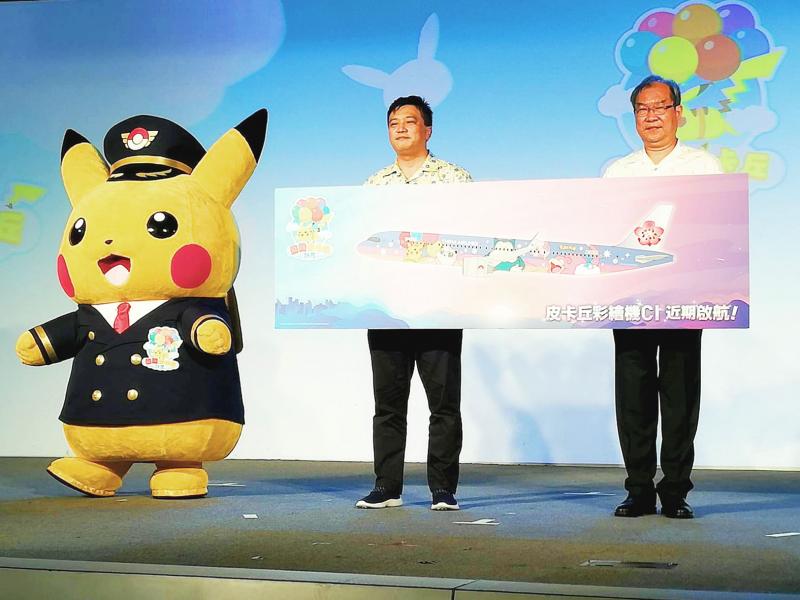China Airlines Ltd (CAL, 華航) is planning to offer 40 percent more passenger flights this quarter than last quarter, as air travel demand is rising, the company said yesterday as it announced the launch of a Pokemon-themed jet.
The airline is planning to paint one of its Airbus A321neo planes with a livery representing the Japanese animation, video game and mobile game franchise, China Airlines told a news conference in Taipei.
Eleven Pokemon characters would be depicted on the fuselage, including Pikachu, Jigglypuff and Snorlax, while the Poke Ball, which players use to capture the characters in the games, would be depicted on the engines, the airline said.

Photo: CNA
“It is the first time that The Pokemon Co partners with a foreign airline to launch a Pokemon-themed airplane,” the company said, adding that it took about two years for the two sides to prepare for the launch.
As the COVID-19 pandemic affects air travel worldwide, the Japanese firm runs a project called “Flying Pikachu” to encourage people to regain their enthusiasm for travel, and the collaboration with CAL is part of the project, Pokemon executive Susumu Fukunaga said.
The Pokemon-themed airplane would be used for flights to North Asian and Southeast Asian destinations, China Airlines said.
It is not easy to forecast when travel demand will fully recover given the emergence of new variants of SARS-CoV-2, but demand should rise more than 40 percent this quarter, CAL president Kao Shing-hwang (高星潢) said.
The airline would steadily increase the number of passenger flights and is planning to offer more flights to London; Bali, Indonesia; and Sapporo, Japan, this quarter, Kao said.
Asked whether ticket prices would remain at a higher level than before the pandemic, Kao said prices would be determined by supply and demand, and might drop during the slow season.
The number of passenger flights would not increase drastically in the near term, the airline said, adding that it expects its air cargo business to remain stable this quarter.

Taiwan’s foreign exchange reserves hit a record high at the end of last month, surpassing the US$600 billion mark for the first time, the central bank said yesterday. Last month, the country’s foreign exchange reserves rose US$5.51 billion from a month earlier to reach US$602.94 billion due to an increase in returns from the central bank’s portfolio management, the movement of other foreign currencies in the portfolio against the US dollar and the bank’s efforts to smooth the volatility of the New Taiwan dollar. Department of Foreign Exchange Director-General Eugene Tsai (蔡炯民)said a rate cut cycle launched by the US Federal Reserve

The US government on Wednesday sanctioned more than two dozen companies in China, Turkey and the United Arab Emirates, including offshoots of a US chip firm, accusing the businesses of providing illicit support to Iran’s military or proxies. The US Department of Commerce included two subsidiaries of US-based chip distributor Arrow Electronics Inc (艾睿電子) on its so-called entity list published on the federal register for facilitating purchases by Iran’s proxies of US tech. Arrow spokesman John Hourigan said that the subsidiaries have been operating in full compliance with US export control regulations and his company is discussing with the US Bureau of

Businesses across the global semiconductor supply chain are bracing themselves for disruptions from an escalating trade war, after China imposed curbs on rare earth mineral exports and the US responded with additional tariffs and restrictions on software sales to the Asian nation. China’s restrictions, the most targeted move yet to limit supplies of rare earth materials, represent the first major attempt by Beijing to exercise long-arm jurisdiction over foreign companies to target the semiconductor industry, threatening to stall the chips powering the artificial intelligence (AI) boom. They prompted US President Donald Trump on Friday to announce that he would impose an additional

Pegatron Corp (和碩), a key assembler of Apple Inc’s iPhones, on Thursday reported a 12.3 percent year-on-year decline in revenue for last quarter to NT$257.86 billion (US$8.44 billion), but it expects revenue to improve in the second half on traditional holiday demand. The fourth quarter is usually the peak season for its communications products, a company official said on condition of anonymity. As Apple released its new iPhone 17 series early last month, sales in the communications segment rose sequentially last month, the official said. Shipments to Apple have been stable and in line with earlier expectations, they said. Pegatron shipped 2.4 million notebook